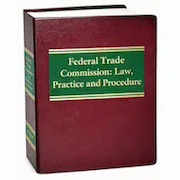Ad Law Insights - Legal and Regulatory Updates
FTC + state attorneys general digital marketing compliance, investigation + enforcement advocacy by FTC lawyer to Internet business community
This website is brought to you by Hinch Newman LLP and FTCDefenseLawyer.com.



The Federal Trade Commission Bureau of Consumer Protection welcomes an open dialogue with parties cooperating with its investigations. According to FTC lawyers, such dialogue allows the agency to make more informed decisions on whether to recommend an enforcement action and, if so, whether such an action can be resolved without the need for protracted litigation.
However, the Federal Trade Commission is also mindful of and believes that delays in investigations can undermine the public interest by allowing alleged lawbreaking to continue and by depriving consumers of redress for harms they may have suffered. Consequently, the FTC has made it clear that while substantive engagement is welcome and constructive, the FTC is prepared to pivot more quickly to litigation if undue delay comes at the expense of redress for consumers.
Delay causes particular concern to the agency in matters where the conduct extends beyond the statute of limitations period. In these cases, the FTC’s ability to provide refunds to injured consumers may be barred in whole or in part.
This risk has become more acute following the Supreme Court’s decision in AMG Capital Management, LLC v. FTC, 141 S. Ct. 1341 (2021). Because of AMG, the FTC can no longer seek monetary relief under Section 13(b) of the FTC Act, 15 U.S.C. § 53(b), which does not have a statute of limitation. Instead, the FTC must often rely on Section 19, 15 U.S.C. § 57b, which authorizes courts to order defendants to provide redress only when violations occurred within three years of the initiation of the Commission’s action.
On December 6, 2023, Federal Communications Commission Chairwoman Jessica Rosenworcel announced a new initiative to strengthen and formalize the cooperation between the FCC and its state partners on privacy, data protection and cybersecurity enforcement matters.
As part of the work of the FCC’s Privacy and Data Protection Task Force, the FCC’s Enforcement Bureau has signed Memoranda of Understanding with Attorneys General of Connecticut, Illinois, New York and Pennsylvania to share expertise, resources and coordinated efforts in conducting privacy, data protection and cybersecurity-related investigations to protect consumers.
The Memoranda of Understanding
The new MOU affirm that the FCC and State Attorneys General “share close and common legal interests in working cooperatively to investigate and, where appropriate, prosecute or otherwise take enforcement action in relation to privacy, data protection or cybersecurity issues” under sections 201 and 222 of the Communications Act.
Coordinated action and information sharing will take place under all applicable federal and state laws, and privacy protections.
Federal and State Comments
FCC Chairwoman Rosenworcel said, in pertinent part, that “[d]efending consumer privacy is an all-of-government responsibility and a shared challenge. Today we take on evolving consumer threats with new formal partnerships with state law enforcement leaders, which have already been successful in obtaining record-breaking results in combatting illegal robocalls.”
FCC Enforcement Bureau Chief Loyann A. Egal said, in pertinent part, that “[u]se of information and communications technology and services have significantly enhanced our lives while at the same time increasing vulnerabilities to our privacy and sensitive data.
On December 13, 2023, the Federal Communications Commission adopted new rules designed to protect consumers from “scam communications” by directly addressing some of the “biggest vulnerabilities” in America’s robotext defenses and closing the “lead generator” robocall/robotexts loophole.
The new rules allow blocking of “red flagged” robotexting numbers, codifies Do-Not-Call rules for texting, and encourages an opt-in approach for delivering email-to-text messages.
Closing the Lead Generator Loophole
The new rules close a loophole through which “unscrupulous robocallers and robotexters inundate consumers with unwanted and illegal robocalls and robotexts.” The new rules make it unequivocally clear that comparison shopping websites and lead generators must obtain consumer consent to receive robocalls and robotexts one seller at a time – rather than have a single consent apply to multiple telemarketers at once.
Combating Robotext Sources
The new rules allow the FCC to “red flag” certain numbers, requiring mobile carriers to block texts from those numbers. The rules also codify that Do-Not-Call list protections apply to text messaging, making it illegal for marketing texts to be sent to numbers on the registry. And the order encourages providers to make email-to-text messages an opt-in service, which would limit the effectiveness of a major source of unwanted and illegal text messages.
Groundwork for Future Steps
In addition to the rules, the FCC also proposed and will take public comment on additional steps it might take against robotexts. The FCC proposes additional blocking requirements when the FCC notifies a provider of a likely “scam text-generating number.” The FCC will also seek further comment on text message authentication – modeled on the implementation of STIR/SHAKEN protocols for phone calls – including on the status of any industry standards in development.
One of the key issues relating to the NPRM pertains to consent being sent directly to/obtained by one seller at a time.
The FCC has now circulated its proposed rule. It has not been adopted yet but it looks like it will be in December when voted upon. It looks like the rule will become effective in or around August or September of 2024.
In pertinent part, the FCC ruling would require terminating mobile wireless providers to block all texts from a particular number when notified by the FCC of illegal texts from that number; codify that the National Do-Not-Call Registry’s protections extend to text messages; and close the lead generator loophole by making unequivocally clear that comparison shopping websites must get consumer consent one seller at a time.
Additionally, as amended “prior express written consent” shall be revised to read, as follows: “The term prior express written consent means an agreement, in writing, that bears the signature of the person called that clearly and conspicuously authorizes no more than one identified seller to deliver or cause to be delivered to the person called advertisements or telemarketing messages using an automatic telephone dialing system or an artificial or prerecorded voice.” The “seller” is not the a lead generator. It is the provider of the products or services
Moreover, “calls must be logically and topically associated with the interaction that prompted the consent and the agreement must identify the telephone number to which the signatory authorizes such advertisements or telemarketing messages to be delivered.” “[R]obotexts and robocalls that result from consumer consent obtained on comparison shopping websites must be logically and topically related to that website.
On October 18, 2023, the Federal Trade Commission announced that it has agreed to a $3.4MM settlement with New Jersey for-profit Sollers College over alleged deceptive ads that lured prospective students into unlawful contracts, purportedly falsely touting relationships with prominent employers and inflating job placement rates. The charges were brought by the FTC and the state of New Jersey.
According to the FTC’s complaint, Sollers, and its parent company, used their website, social media, and email campaigns to falsely advertise their partnerships with prominent employers in the fields of information technology, clinical research and drug safety. According to the complaint, Sollers falsely claimed that its partnerships with prominent employers, such as Pfizer, Weill Cornell Medicine, and Infosys, resulted in jobs for its graduates at those companies. Many of the businesses featured on Sollers’ website had no partnership with the school at all, says the FTC.
The complaint states that, since at least 2018, Sollers advertised that the vast majority of Sollers graduates are placed in jobs. For example, the company purportedly advertised, “90% of our students are placed within 3 months of graduation,” on its website. In reality, the job placement rate for Sollers graduates is substantially lower than the 80 percent, 82 percent, 90 percent or “near perfect” rates featured prominently on its website and in its advertising campaigns, the FTC states. According to the FTC, the school’s own data suggests that the current job-placement rate for graduates of its Life Sciences programs remains as low as 52 percent.
Topics
Archives
About This Blog and Hinch Newman’s Advertising + Marketing Practice
Hinch Newman LLP’s advertising and marketing practice includes two decades successfully resolving some of the highest-profile Federal Trade Commission (FTC) and state attorneys general digital advertising and telemarketing investigations and enforcement actions. As FTC attorneys, the firm possesses superior compliance knowledge and deep legal advocacy experience in the areas of advertising, marketing, lead generation, promotions, e-commerce, privacy and intellectual property law. It has also been selected to author the Consumer Protection Section of the prestigious American Lawyer Media International Federal Trade Commission: Law, Practice and Procedure Treatise, a comprehensive resource for developments of concern to advertisers, marketers and legal professionals that practice before the Commission. Through these advertising and marketing law updates, Hinch Newman LLP provides commentary, news and analysis on issues and trends concerning developments of interest to digital marketers, including FTC and state attorneys general advertising compliance, civil investigative demands (CIDs), and administrative/ judicial process.
